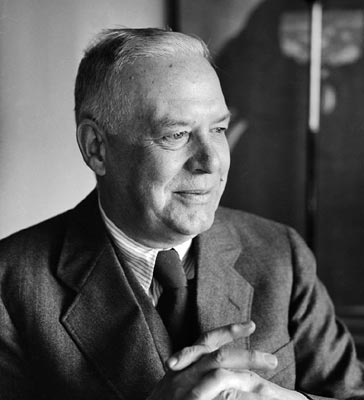On this date in 1870, Wallace Stevens, a major American poet, was born to a Lutheran family in Reading, Pa. His father was a prosperous lawyer. He displayed a talent for writing in high school, then attended Harvard University from 1897 to 1900, where he studied literature. He worked briefly as a reporter for the New York Evening Post before enrolling in the New York School of Law and graduating in 1903.
In 1909 he married Elsie Viola Kachel over the objections of his parents, who considered her poorly educated and lower class. The New York Times reported in 2009 that “Nobody from his family attended the wedding, and Stevens never again visited or spoke to his parents during his father’s lifetime.” They remained married until his death in 1955. A daughter, Holly, was born in 1924 and was baptized Episcopalian. She posthumously edited her father’s letters and a collection of his poems.
Under a pen name, Stevens sent a group of poems titled “Phrases” to a competition in Poetry magazine in 1914. He didn’t win but his poems were published in the magazine later that year. Stevens moved to Connecticut, where he joined the staff of Hartford Accident and Indemnity Co., in 1916. He worked there for the rest of his life, becoming vice president in 1934. Stevens started to earn a name for himself in the writing community and published the prize-winning play “Three Travelers Watch a Sunrise” in 1916.
Stevens published a collection of over 50 poems in a single volume, Harmonium in 1923. Key pieces included “Peter Quince and the Clavier” and “Sunday Morning,” which are threaded with themes that challenge ideas central to Christianity and immortality. His second collection, Ideas of Order (1934), received more recognition. His breakthrough book was The Man with the Blue Guitar (1937). Other volumes Stevens published include Notes Toward a Supreme Fiction (1947), The Auroras of Autumn (1950) and The Necessary Angel (1951). He was awarded the 1955 Pulitzer Prize for Poetry for The Collected Poems of Wallace Stevens.
In “Sunday Morning,” Stevens explored the topic of death and the communion of the body back to nature. Dismissing faith in a spiritual afterlife, Stevens replaced scriptural myths of heaven with the holy and transformative powers of nature. It expresses a celebration of a spirituality that is founded on the glory of nature. In her book on Stevens’ poetry, Susan B. Weston called “Sunday Morning” the “revelation of a secular religion.”
According to biographer Milton Bates, Stevens was strongly influenced by Santayana and Nietzsche. (D. 1955)


